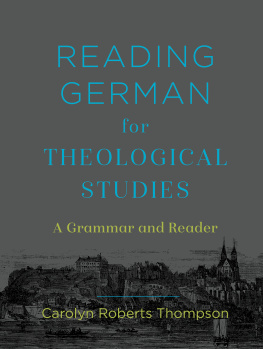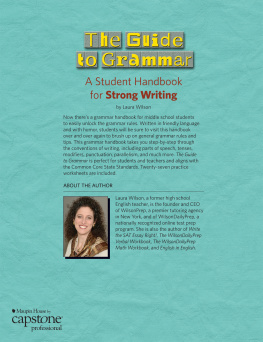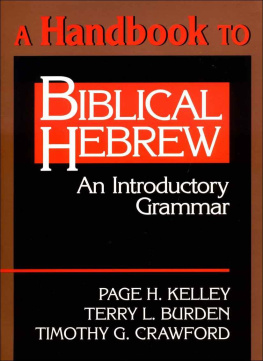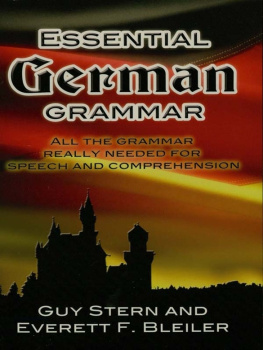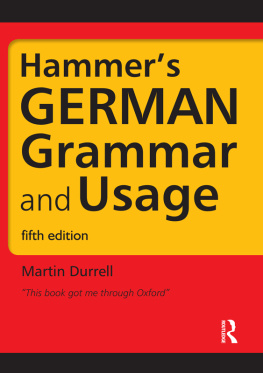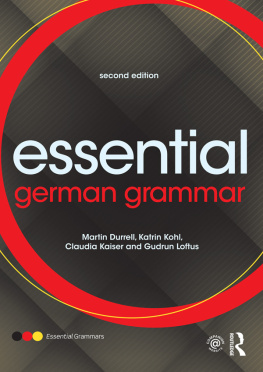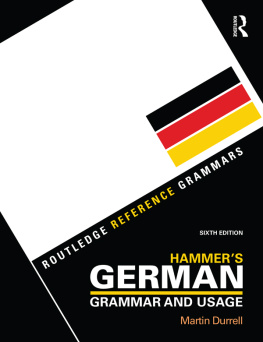All rights reserved. No part of this publication may be reproduced, stored in a retrieval system, or transmitted in any form or by any meansfor example, electronic, photocopy, recordingwithout the prior written permission of the publisher. The only exception is brief quotations in printed reviews.
Library of Congress Cataloging-in-Publication Data is on file at the Library of Congress, Washington, DC.
Scripture quotations labeled Einheitsbersetzung are from Die Einheitsbersetzung der Heiligen Schrift Katholische Bibelanstalt, Stuttgart. All rights reserved.
Scripture quotations labeled Luther are from the Lutherbibel Deutsche Bibelgesellschaft, Stuttgart. All rights reserved.
Scripture quotations labeled Zrcher are from the Zrcher Bibel TVZ Theologischer Verlag Zrich AG. All rights reserved.
Baker Publishing Group publications use paper produced from sustainable forestry practices and post-consumer waste whenever possible.
Contents
Half Title Page
Title Page
Copyright Page
Preface
How to Get the Most from This Book
Abkrzungen (Abbreviations)
Introduction
Readings
Instructions for Readings 16
1. Amos 2,13
2. Amos 2,45
3. Amos 2,67
4. Amos 3,12
5. Amos 3,1315
6. Amos 7,13
Instructions for Readings 716
7. Matthus 7,2427
8. Lukas 10,2537
9. Matthus 5,1316
10. Matthus 8,14
11. Markus 1,4045
12. Lukas 5,1216
13. Matthus 14,1321
14. Markus 6,3044
15. Lukas 9,10b17
16. Johannes 6,115
17. Lohfink, Die synoptische Frage
18. Bethlehem
19. Beelzebul
20. Jeremias, Der Prophet Amos
21. Kessler, Die soziale Krise des 8. Jahrhunderts
22. Schweizer, Johannes der Tufer
23. Moltmann, Christliche Erneuerungen
24. Bonhoeffer, Tischgemeinschaft
Instructions for Readings 2528
25. Pneumatologie und Spiritualitt
26. Luther
27. Calvin
28. Zwingli
30. An die Kulturwelt!
31. Barth, Vorwort zu Der Rmerbrief
32. Barth, Nachwort zu Schleiermacher
33. Bonhoeffer, Beichte und Abendmahl
34. Die Barmer Erklrung
35. Sthr, Ein Vortrag ber Niemller
36. Bauer, Rechtglubigkeit und Ketzerei im ltesten Christentum
Instructions for Readings 3745
37. Glaube
38. Bauks, Theologische Themen in ihren biblischen Kontexten
39. Moltmann, Folgen der Nachfolge
40. Grillmeier, Jesus der Christus im Glauben der Kirche
41. Barth, Der Rmerbrief
42. Gebauer, Paulus als Seelsorger
43. Lohfink, Wem gilt die Bergpredigt?
44. Lohfink, Das Vaterunser
45. Ein Lied in Frakturschrift
Learning Resources
Supplementary Bible Readings
Zahlen (Numbers)
Reference Grammar
Answer Key to Assignments
Works Cited
German-English Glossary
Index
Back Cover
Preface
When I was first asked to teach a class in reading German for students wanting to pursue graduate work in religious studies, I started looking for a textbook. When I could not find any book I liked (what teacher ever agrees totally with a textbook?), a German professor friend suggested I write my own. It has been a learning experience.
Through the years, I have become increasingly aware of the importance of German scholarship for theological studies. Some German works have been translated into English, but the vast majority have not. Besides that, reading German scholarship in the original language opens the reader to a new way of thinking. Even when I read my German Bible, I often see ideas in a new light.
My hope is that this book will help aspiring students begin to learn German for reading theological materials. It will not be a short trip. I have been learning German for years and am still learning. It is well worth the journey.
I want to thank my husband, James W. Thompson, for taking me to Germany the first time in 1972, a year-long stay that allowed me to begin what has become a passion for me: to open a new world to my students. I also want to thank him for encouraging me in the writing of this book, including correcting my mistakes. Any remaining mistakes are my own.
Thanks to Gerda and Josef Schauer, who took me in when I needed a place to stay while visiting Germany in 1990 and who have remained great friends throughout the years.
Thanks also to Mac Ice, director of special collections and archives at Abilene Christian Universitys Brown Library, for giving me access to two Luther Bibles, published in 1826 and in 1877, respectively.
Special thanks to Bryan Dyer, acquisitions editor at Baker Academic, for patiently prodding me and giving me guidance for making this book better than it was when he first saw it. Thanks also to Wells Turner for carefully reading and finding places where more explanations or corrections were needed.
Wer fremde Sprachen nicht kennt, wei nichts von seiner eigenen.
Johann Wolfgang von Goethe
As an encouragement to those who are trying to understand the readings in this book:
Der Geist einer Sprache offenbart sich am deutlichsten in ihren unbersetzbaren Worten.
Maria von Ebner-Eschenbach
How to Get the Most from This Book
What is your purpose for reading this book? I assume the answer has to do in some way with your desire to learn to read German, more specifically to read German for theological studies. If that is the case, I want to help you make the most of your time as you begin. It will not be a short read.
I have designed the lessons to expose you to authentic German texts from the start and to acquaint you with the grammar as you read. Each reading is glossed; that is, it has accompanying vocabulary keyed to the text. The grammar needed to understand the text is explained after each reading. To get the most out of the readings, you will need to learn (memorize) as much of the vocabulary as you can. Once a word has been introduced, it is not usually repeated in the vocabulary for subsequent readings. I suggest that you create vocabulary cards and review them often. You may choose to create digital vocabulary cards, but research confirms that writing the words by hand improves retention. Be sure to write the words correctly, however, because it is very difficult to relearn words that you have learned incorrectly.
One bad habit to avoid: Do not write the meanings of the German words between the lines of the reading. If you do so, your eyes will naturally tend to look at the English instead of the German as you read, and this will hinder your learning.
You will also need to learn the grammar, including verb conjugations and noun declensions. German is a highly inflected language, so you will need to learn cases and tenses. As was true of the vocabulary, paradigm tables of various parts of speech are not repeated in succeeding lessons, but for reference a chapter appears at the end of the book containing all the paradigms presented in the lessons. Along with all the paradigms for nouns, verbs, and adjectives, the reference chapter includes many examples and explanations. Do not forget that it is there.
Do the assignment for each reading, and then check your answers at the back of the book. Looking at the answers before you complete the assignment will of course work against your efforts to master the material and hinder your ability to read independently. Many of the assignments say simply translate the reading. When you check your translations, look carefully at the verb forms (number, tense, mood, and voice). Most German verbs end with a t in the third-person singular present tense indicative mood. Your ear may hear this as the -ed of the English past tense and lead you to translate these forms as past tense. Do not fall into this trap. Check the verb forms carefully.

